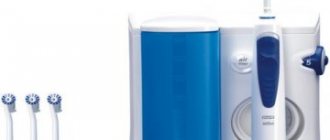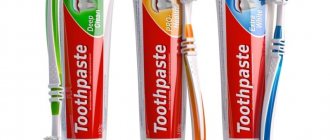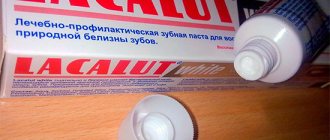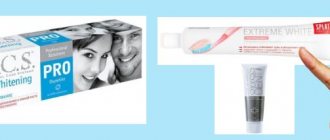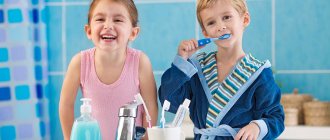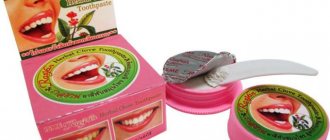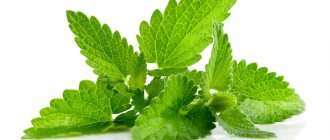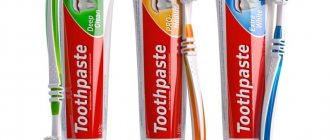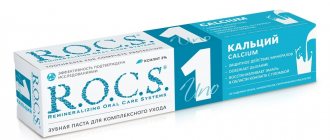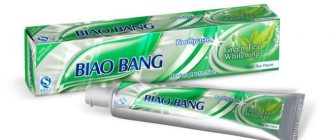“Tooth gels are better than toothpastes”, “You need to brush your teeth five times a day”, “The more paste on your toothbrush, the better your teeth will be cleaned” - such statements that we come across on the Internet and hear from friends often confuse us. sense and force them to follow their lead.
When visiting the dentist, patients often ask questions about toothpaste and brushes. Which toothpaste is better? What brushes should you use? How often should you brush your teeth? It is not surprising, because brushing your teeth is one of the simplest and at the same time most effective ways to care for the oral cavity and prevent various diseases of the teeth and gums. Your dentist can tell you how to brush your teeth properly and which toothpaste to choose in each case. And also dispel common myths and stereotypes about the technique of brushing teeth, about the choice of toothpaste and brush.
What do patients ask most often? And what do dentists say? We present the 10 most popular questions during an appointment with a specialist.
Question No. 1. Is it true that whitening toothpastes are harmful to teeth?
True, if you use cheap, highly abrasive pastes. The abrasive particles they contain scratch tooth enamel like scouring powder scratching a kitchen stove. There are five levels of paste abrasiveness in total. On the packaging it is marked with the index RDA (Radioactive Dentin Abrasion) and indicates the particle size.
When choosing a whitening paste for adults, you should know that its optimal level of abrasiveness is RDA 70-120. Among such pastes, LACALUT White (abrasiveness index - RDA 120), SPLAT whitening Plus, SILCA Arctic White (abrasivity index - RDA 85), PRESIDENT White have proven themselves well. Pastes with a high level of abrasiveness (120-160) should be used to clean pigmented enamel no more than twice a week. Dentists use a range of pastes, for example, PRESIDENT White Plus.”
Question No. 2. Are toothpastes that contain antiseptics safe?
Not if you use such pastes constantly. As a rule, pastes containing antiseptics (triclosan, chlorhexidine, hexitidine) are prescribed for inflammatory gum diseases. You should brush your teeth with such pastes for no more than two weeks in a row. With their frequent use, antiseptics, designed to destroy only harmful bacteria, can smoothly switch to useful ones: a certain balance between microorganisms is disturbed, resulting in painful processes.
Toothpastes containing antiseptics as the main components, for example, Lacalut Aktiv, PresiDENT Active, SPLAT Professional ACTIVE, Elmex Aronal, Blend-a-med Pro-Expert Gum Protection, are considered harmless, but for their correct use, consultation with your doctor is necessary.
Benefits of use
Of course, the price of Elgidium toothpaste is not the lowest. It costs from 300 to 500 rubles. You just need to understand that the money spent on it is the smallest share that you can pay for the ideal health of your teeth. If you take care of it with this paste, then you won’t need expensive treatment. For the money spent, you can get a really high-quality product that has long proven itself among a wide range of people.
If you carefully study the reviews of Elgidium toothpaste, which are mostly positive, you can easily understand how valuable it is for a modern person. Naturally, not all people eat healthy foods, and certainly not everyone visits the dentist regularly. And with constant use of Elgidium toothpaste, you will no longer need to think about all these little things.
Question No. 3 What is better: toothpastes or gels?
According to experts, both clean teeth equally well. And besides the taste and structure (gel pastes are more transparent than regular ones due to the absence of calcium carbonate and titanium dioxide in them, which give the paste a white color), there are no significant differences between them. So whether to use toothpaste or gel is a matter of everyone’s taste! Among the most popular among patients are such dental gels as Colgate Total 12 Pro-Clean Gel, Splat Liquium-gel, Weleda paste-gel, LACALUT fluor Gel.”
Use of chlorhexidine in dentistry
The drug helps to cope with many oral problems. If you eliminate them in the first stages of manifestation, you can avoid serious problems and dental treatment. Antiseptics are used to treat a number of diseases of the teeth and gums:
- pulpitis;
- stomatitis;
- gingivitis;
- caries;
- periodontitis;
- glossitis;
- osteomyelitis;
- abscesses;
- infections of soft and hard tissues;
- injuries, etc.
Before you start choosing antiseptic products, you need to consult a specialist.
Most problems are associated with infection of the mucous membranes and soft tissues of the periodontium. They are a system with its own microflora, consisting of fungi and bacteria. Useful elements keep the oral cavity healthy. If pathogenic substances enter their structure, painful symptoms appear.
Chlorhexidine helps neutralize pathogenic microflora. But with prolonged use, beneficial bacteria also die. This leads to disruption of natural defense mechanisms. Teeth and gums become more susceptible to pathogenic microorganisms.
When using medications, it is important to follow the cleaning rules:
- brush your teeth regularly twice a day;
- remove dirt using “sweeping” rather than “sawing” movements;
- additionally use rinses and flosses;
- use medications in a course.
Following the dentist’s recommendations is the key to effective treatment of teeth and gums.
Question No. 4. Is it true that toothpastes with healthy additives clean your teeth better?
Yes, if we are talking about extracts of medicinal plants such as sage, chamomile, St. John's wort, which have beneficial properties. For example, Forest Balsam paste with the addition of sage or St. John's wort does an excellent job.
However, those pastes that contain additives, such as sea salt (Dentalys paste), can cause an allergic reaction and even increased tooth sensitivity. Such pastes must be used according to the doctor’s recommendations, as a rule, no more than 1-2 times a week.”
Question No. 5. Does fresh breath always mean clean teeth?
Feeling fresh in your mouth is not an indicator of excellent oral hygiene. But the absence of plaque on the teeth is just convincing proof that the teeth are really clean. And if after brushing your teeth become smooth (you can check this by running your tongue over them), then you can say that the toothpaste has coped with the task.
It is especially important for smokers and coffee or strong tea drinkers to combat pigmented plaque, for example, using REMBRANDT Anti-Tobacco and Coffee toothpaste, which effectively breaks down plaque on the surface of the teeth.”
Consumer Opinions
There are many consumer reviews on the Internet about Elgidium paste, here are some of them:
Smoking and coffee did their job - tartar, yellowness. Most unpleasant. The dentist recommended Elgidium paste with a whitening effect. Indeed, 2 weeks of use and my teeth became noticeably whiter. In addition to fresh breath, self-confidence. I recommend to everyone!
Natalya, 35 years old
I have been using Elgidium sensitive for 3 weeks. Pleasant smell and taste. Excellent for inflammation and bleeding gums. All inscriptions are in Russian. The instructions for the paste are detailed, there is even a plan for brushing your teeth. The good news is that the ingredients are on both the packaging and the tube. And in Russian. The paste consumption is very economical. Dentist advised. Among the shortcomings, there is one obvious one: you can only buy it at a pharmacy, and not every one has it in stock, but otherwise it’s an excellent product.
Polina, 43 years old
Question No. 6. Is it possible to whiten teeth with toothpaste in a few days?
No. No toothpaste will make your teeth perfectly white. Unscrupulous manufacturers attract the attention of consumers with sophisticated advertising campaigns, and for greater “effect” they add coarse abrasives or peroxides to their products, which not only remove plaque from teeth, but also harm the enamel.
If the desire to have a snow-white smile is very great, you can get closer to your cherished goal! Professional teeth cleaning and whitening in a dental setting will help achieve the desired result.”
Company manufacturer
) has been successfully operating for more than 40 years not only in France, where it ranks 2nd among private pharmaceutical companies.
Representative offices are located in more than 140 countries. Research and development innovation is the main reason for the company's success. Divisions, in fact, are independent units with a specific focus:
- Pierre Fabre Medicine – drugs of therapeutic value;
- Pierre Fabre Health specializes in the production of sanitary and hygiene products;
- Pierre Fabre Oncology aims to produce drugs against tumors.
The products of this brand appeared on the Russian market back in 1993. In 1999 A representative office was opened, and in 2009 The opening of a subsidiary, Pierre Fabre LLC, took place. The main activity in Russia is the sale of dermocosmetics (dermatological and aesthetic areas). Sold only in pharmacy chains.
Question No. 7. Can children use adult toothpaste?
No, because the fluoride contained in the toothpaste is good for teeth, but swallowing it is harmful. And small children, sometimes unknowingly, swallow up to 35% of toothpaste while brushing.
Therefore, special children's toothpaste is produced for children with a low fluoride content (up to 500 ppm), and to make brushing teeth seem more pleasant to the baby, special flavoring additives are added (the taste of berries, chewing gum, etc.).
Parents should remember that children under 6 years of age should brush their teeth under their supervision to prevent the child from swallowing the toothpaste. To get acquainted with children’s toothpaste, you can choose products from brands such as ROCS kids, Splat junior, Colgate, LACALUT or Silca.”
Review of the Elgydium paste line
Let's take a look at the range of pastes.
Elgidium against plaque
The paste is white in color and has a dense consistency. With a refreshing effect. Active ingredients: chlorhexidine, calcium carbonate.
Chlorhexidine in Elgidium toothpaste effectively removes plaque and has pronounced antiseptic properties: it kills bacteria and reduces inflammation.
Calcium carbonate increases the acid-base balance of saliva, which neutralizes the acidic environment in the oral cavity and slows down the growth of bacteria. Restores collagen bonds in the gums. Improves the structure of the gum surface, stops minor bleeding.
Indications for use:
- helps remove plaque;
- removes tartar;
- is part of a set of measures for the treatment of dental diseases.
Contraindications: hypersensitivity to individual components included in the composition.
Directions for use: apply 2 times a day. Apply a small amount of paste to the brush and brush your teeth for 2-3 minutes. It is especially good to clean the area between the teeth and gums. You can't swallow.
Application must be agreed with the treating dentist. It is not recommended to use for more than 1 month. You need to take a break for 2 weeks.
Has a pronounced antiseptic effect.
Advantages:
- high efficiency;
- low allergenicity;
- long-lasting fresh breath.
Disadvantages: distributed only in pharmacies and the Internet; high price.
Result: Elgidium bactericidal paste effectively fights plaque, eliminates bleeding, slows down inflammatory processes (gingivitis, periodontitis, etc.).
Elgidium sensitive
The paste is white in color, has a pleasant gel consistency, and has a pleasant mint taste.
Fluorinol is effectively fixed to the enamel, penetrates deeply into it, and seals the dentinal tubules.
Indications: used to reduce painful sensitivity, strengthens and protects teeth, preventing the action of aggressive factors. Used as a prophylaxis for oral diseases.
Contraindications: children under 12 years of age, individual intolerance to the components.
Advantages:
- quick effect;
- remineralization of enamel;
- analgesic effect;
- increased salivation;
- low imagery;
- blocking the development of pathologies.
Disadvantages: it is necessary to take two-week breaks between monthly courses of use; May cause gum burning in some users.
Directions for use: Apply as a regular paste. Using a low-hardness brush, 2-3 minutes, 2 times a day. Swallowing is prohibited. Duration of use is up to 1 month. Use as recommended by a doctor.
Prescribed for dental hypersensitivity, prevention of caries and periodontal diseases.
Result: a noticeable reduction in tooth sensitivity, restoration of damaged areas of enamel, preservation of the integrity of dental tissues.
Elgidium whitening
Beautiful translucent turquoise color, slightly minty smell.
Sodium bicarbonate particles penetrate into the smallest cracks of the enamel, carefully whiten it, and remove stains. In this case, there is no trauma to the enamel. Helps maintain the results of whitening or stone removal procedures.
Contraindications: age under 12 years, individual intolerance.
Advantages: quickly restores the whiteness of teeth, effectively fights stains and darkening, gets rid of stone.
Disadvantages: cannot be used regularly. The maximum period of use is 1 month.
Course of administration and dosage: apply a small amount of paste to the brush, lightly massage the tooth surface for 2-3 minutes. Apply 2 times a day. Recommended course is 2-4 weeks. If the desired effect is not achieved, repeat the course after a 2-week break. Do not swallow.
The components of the paste may irritate the gums. In this case, it is necessary to reduce the use to 1 time per day, alternating with regular paste.
Allows you to easily and quickly get rid of stains on your teeth and whiten them. The result is noticeable after a week of use.
